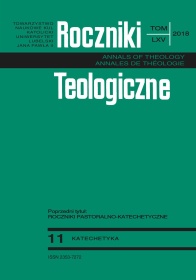The Formation of Catechists Through a Laboratory
Abstrakt
Kształcenie katechetów przez laboratorium
Artykuł pokazuje jak można prowadzić ciągłą formację katechetów w sposób bardziej dostosowany do współczesnych potrzeb. Dziś już nie można mówić o jednolitym społeczeństwie, gdzie spotykamy się z takimi samymi trudnościami i problemami. Z drugiej strony, nasze społeczeństwo charakteryzuje się ciągłą zmianą i płynnością. Laboratorium, jako metoda ciągłej formacji katechetów, szuka aktywnego sposobu, by wyjść naprzeciw tym oczekiwaniom. Laboratorium jako metoda formacji katechetów posiada cechy i zalety wykraczające daleko poza inne tradycyjne metody formacji katechetów, co wyraźnie czyni tę metodę lepszą formą ciągłej formacji dla nich. Opis cech i zalet tej metody został omówiony w tekście.
Bibliografia
Alberich, Emilio and Vallabaraj Jerome. Communicating a Faith that Transforms. A Handbook of Fundamental Catechesis. Bangalore: Kristu Jyoti Publications, 2004.
Alberich, Emilio. La catechesi oggi. Manuale di catechetica fondamentale. Leumann (To): Editrice Elledici, 2001.
Barbon, Giancarla. “Il laboratorio come luogo di formazione integrale.” Via, Verità e Vita 196(2004), 60-61.
Biemmi, Enzo. Compagni di viaggio. Laboratorio di formazione per animatori, catechisti di adulti e operatori pastorali. Bologna: Edizioni Dehoniane Bologna, 2003.
Blaquart, Jean-Luc. “Formarsi: perché? Come?.” In Tabor. L’enciclopedia dei catechisti. Edited by CNER, 261-263. Milano: Edizioni Paoline, 1995.
Conferenza Episcopale Italiana – Commissione per la Dottrina della Fede La Catechesi e La Cultura. La formazione dei catechisti nella comunità cristiana. Orientamenti pastorali (25th March 1982). Bologna: Edizioni Dehoniane Bologna, 1982.
Conferenza Episcopale Italiana – Ufficio Catechistico Nazionale. Orientamenti e itinerari di formazione dei catechisti (2nd April 1991). Bologna: Edizioni Dehoniane Bologna, 1991.
Conferenza Episcopale Italiana. Il rinnovamento della catechesi (2nd February 1970). Roma: Edizioni Pastorali Italiane, 1970.
Congregation for the Clergy. General Directory for Catechesis (15th August 1997) (online: http://www.vatican.va/roman_curia/congregations/cclergy/documents/rc_con_ ccatheduc_ oc_17041998_directory-for-catechesis_en.html) accessed on 15th January 2018.
Congregation for the Evangelisation of Peoples. Guide for Catechists. Document of Vocational, Formative and Promotional Orientation of Catechists in the Territories dependent on the Congregation for the Evangelisation of Peoples (3rd December 1993) (online: http://www.vatican.va/roman_curia/congregations/cevang/documents/rc_con_cevang_doc_19971203_cath_en.html) accessed on 25th January 2018.
Duffy, Thomas M. and Jonassen, David H. Constructivism and the Technology of Instruction. A Conversation. Hillsdale N.J.: Lawrence Erlbaum Associates Publishers, 1993.
Ferrario, Fulvio. La teologia del Novecento. Roma: Carocci Editore, 2011.
“Formazione.” In Dizionario di Pedagogia e Scienze dell'Educazione. Edited by Bertolini, Piero, 213. Bologna: Zanichelli Editore, 1996.
Grennon Brooks, Jacqueline and Grennon Brooks, Martin. In Search of Understanding. The Case for Constructivist Classrooms. Alexandria Va: Association for Supervision and Curriculum Development, 1993.
John Paul II, Apostolic Exhortation Catechesi Tradendae (16th October 1979) (online: http:// w2. vatican.va/ content/john-paul-ii/en/apost_exhortations/ documents/hf_jp-ii_exh_161019 79_catechesi-tradendae.html) accessed on 1st February 2018.
John Paul II. Encyclical Letter Redemptoris Missio (7th December 1990) (online: http://w2.vatican.va/content/john-paul-ii/en/encyclicals/documents/hf_jp-ii_enc_07121990_redemptoris-missio.html) accessed on 20th January 2018.
Jones, Gareth (ed.). The Blackwell Companion to Modern Theology. Malden (MA)–Oxford– Victoria Australia: Blackwell Publishing, 2004.
Lave, Jane and Wenger, Etienne. Situated Learning. Legitimate Peripheral Participation. Cambridge: Cambridge University Press, 1991.
Lipari, Domenico. “È possibile formare?” In Catechesi e formazione. Verso quale formazione a servizio della fede?. Edited by Calabrese, Savino, 39-54. Leumann (To): Editrice Elledici, 2004.
Lipari, Domenico. “L'azione formativa tra adattamento e apprendimento.” Catechesi 72(2003), 6: 3-12.
Morante, Giuseppe. “La catechesi nella chiesa particolare: progetti e strategie.” In Andate e Insegnate. Manuale di catechetica, edited by Istitutoi di Catechetica – Facoltà di Scienze dell’Educazione – Università Pontificia Salesiana, 329-355. Leumann (To): Editrice Elledici, 2002.
Murphy, Elizabeth. Characteristics of Constructivist Learning and Teaching (online: http://w ww.ucs.mun.ca/~emurphy/stemnet/cle3.html) accessed on 15th February 2018.
Nanni, Carlo. “Formazione.” In Dizionario di Scienze dell'Educazione. Edited by Prellezo, José Manuel and Malizia, Guglielmo and Nanni, Carlo, 472-475. Roma: LAS, 20082.
Paganelli, Rinaldo. “Formazione: prospettive di futuro.” Catechesi 74(2004-2005), 1: 55-62.
Paganelli, Rinaldo. Formare i formatori dei catechisti. Valori e itinerari sottesi al processo formativo. Bologna: Edizioni Dehoniane Bologna, 2002.
Paganelli, Rinaldo. Pensare e attuare la formazione. Leumann (To): Editrice Elledici, 2016.
Paul VI, Apostolic Exhortation Evangelii Nuntiandi (8th December 1975) (online: http://w2. vatican.va/content/paul-vi/en/apost_exhortations/documents/hf_p-vi_exh_19751208_evangelii-nuntiandi.html) accessed on 20th January 2018.
Proverbio, Germano. “Informazione: teoria della.” In Dizionario di Scienze dell’Educazione. Edited by Prellezo, José Manuel and Malizia, Guglielmo and Nanni, Carlo, 578. Roma: LAS, 20082.
Soravito, Lucio. “Catechista (formazione).” In Dizionario di Catechetica. Edited by Gevaert, Joseph, 128-129. Leumann (To): Editrice Elledici, 1987.
Wenger, Etienne and McDermott, Richard and Synder, William M. Cultivating Communities of Practice. Boston, Massachusetts: Harvard Business School Press, 2002.
Wenger, Etienne. Communities of Practice. Learning, Meaning, and Identity. Cambridge: Cambridge University Press, 1998.
Copyright (c) 2018 Roczniki Teologiczne

Utwór dostępny jest na licencji Creative Commons Uznanie autorstwa – Użycie niekomercyjne – Bez utworów zależnych 4.0 Międzynarodowe.





